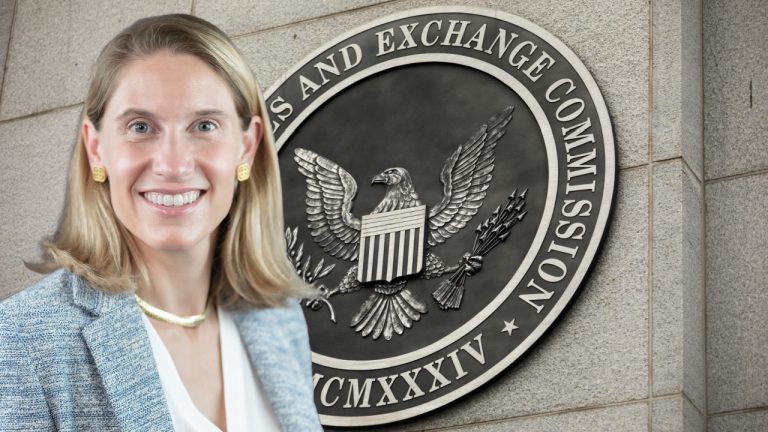
Commissioner Crenshaw Raises Concerns about Investor Protection and Market Integrity
SEC Commissioner Caroline A. Crenshaw has expressed her dissent following the SEC's approval of spot bitcoin ETFs. In a letter, she raises serious concerns regarding investor protection and market integrity.
Inconsistency with the SEC's Mandate
Crenshaw argues that the approval of rule changes allowing the listing and trading of bitcoin-based ETPs on national securities exchanges is inconsistent with the SEC's mandate to protect investors and the public interest.
Concerns about Global Spot Markets
The Commissioner's primary concern revolves around the underlying global spot markets for bitcoin, which she believes are vulnerable to fraud and manipulation. She points to examples such as the alleged bitcoin price manipulation by the former CEO of FTX. Crenshaw also cites the recent hacking of an SEC social media account and subsequent false announcement of spot bitcoin ETFs, which led to volatile bitcoin prices, as indicative of potential market manipulation.
Concentration of Bitcoin Ownership
Crenshaw expresses concern about the concentration of bitcoin ownership among spot bitcoin holders. She argues that this leaves bitcoin investors, including spot bitcoin ETP investors, vulnerable to the actions of a few individuals. Analysis shows that mining and holdings of bitcoin are highly concentrated.
Inadequate Oversight and Manipulation
According to Crenshaw, the spot bitcoin markets' susceptibility to manipulation and the lack of adequate oversight make it difficult to conclude that the approved rule changes effectively protect investors.
Inadequate Correlation Analysis
Crenshaw critiques the correlation analysis used to justify the approval of spot bitcoin ETPs. She highlights the significant differences in investor protection between futures and spot bitcoin ETPs, emphasizing the latter's lack of regulation and potential for fraud or manipulation.
Recreation of the Financial System
Crenshaw questions the tendency within the cryptocurrency ecosystem to recreate the existing financial system with less regulation and more risk. She expresses concerns about diverging from the original ideals of Bitcoin as a peer-to-peer, censorship-resistant digital currency. Crenshaw fears that linking Bitcoin too closely to the traditional financial system may not serve the interests of investors but rather inflate the prices of these investment products.
Share your thoughts and opinions about Commissioner Crenshaw's concerns in the comments section below.
CFTC
forbes.com
- Gold IRA: Add some sparkle to your retirement nest egg
- Understanding China's Evergrande Crisis – Forbes Advisor
How To
3 Ways to Invest in Gold for Retirement
It's crucial to understand where gold fits in your retirement strategy. If you have a 401(k) account at work, there are several ways you can invest in gold. It is also possible to invest in gold from outside of your work environment. For example, if you own an IRA (Individual Retirement Account), you could open a custodial account at a brokerage firm such as Fidelity Investments. If you don't have any precious metals yet, you might want to buy them from a reputable dealer.
These are the rules for gold investing:
- Buy Gold With Your Cash – Do not use credit cards to purchase gold. Instead, put cash into your accounts. This will help protect you against inflation and keep your purchasing power high.
- Own Physical Gold Coins – You should buy physical gold coins rather than just owning a paper certificate. It's easier to sell physical gold coins rather than certificates. There are no storage fees for physical gold coins.
- Diversify Your Portfolio. Never place all your eggs in the same basket. This is how you spread your wealth. You can invest in different assets. This helps to reduce risk and provides more flexibility when markets are volatile.
—————————————————————————————————————————————————————————————-
Based on [POSTTITLE]
by [POSTAUTHOR]
Related posts:
 SEC Commissioner Slams Delay in Approving Spot Bitcoin ETFs
SEC Commissioner Slams Delay in Approving Spot Bitcoin ETFs
 Financial Watchdog Urges SEC to Reject Spot Bitcoin ETFs, Citing Investor Harm
Financial Watchdog Urges SEC to Reject Spot Bitcoin ETFs, Citing Investor Harm
 Vaneck Director Calls SEC’s Cash-Only Requirement for Bitcoin ETFs “Nonsense”
Vaneck Director Calls SEC’s Cash-Only Requirement for Bitcoin ETFs “Nonsense”
 Blackrock Urges SEC to Approve Spot Ethereum ETFs for the Protection of U.S. Investors
Blackrock Urges SEC to Approve Spot Ethereum ETFs for the Protection of U.S. Investors










